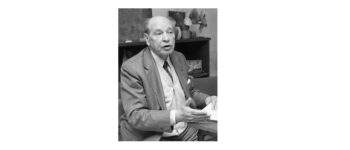Biography of Claude Robert Cloninger (1944)

- 1164
- 152
- Hugh Greenholt
Claude Robert Cloninger is an American psychiatrist and geneticist who has managed to combine the best of its academic preparation to make impressive discoveries about personality. This has been that he has conferred multiple awards and honorary mentions. Cloninger has started from its concerns and has been strengthened in its advanced studies to achieve that fields such as physiological and spiritual can be integrated, analyzing the human being in all its dimensions.
Content
Toggle- Who is Claude Cloninger?
- Research
- The dimensions of character
- Bibliography
Who is Claude Cloninger?
It could not be a mistake to affirm that Claude Robert Cloninger stands out for having a mind as bright as few scientists today. He was born in Texas in 1944, in Beaumont. His father, called Morris Cloninger, was a professor of English and entrepreneur, while his mother, named Concetta, was dedicated to acting in a local theater. Now, it is impressive how the son of a teacher and an actress felt such an amazing concern for the personality that he decided to venture into the scientific world.
In 1962 Claude Cloninger began to attend the University of Texas, in an honors plan. But In addition to studying medicine, he also studied cultural anthropology, philosophy and psychology. In all these areas his participation was highlighted and received distinctions. It is possible that Cloninger has understood that, in order to study the human being in its entirety, it needed a fairly deep preparation and that it is complemented, so that the results of their investigations did not present man as a scheduled being.
Claude Cloninger remained in the School of Intensive Medicine at the University of Washington from 1966 to 1970. Almost all his research career has carried out in ST. Louis. He also obtained a scholarship to investigate preventive medicine and its relationship with public health. One of his wishes was to understand more about antisocial personality disorder, somatization disorder and substance dependence, since many times these were gathered in the same person, or in the family nucleus. This was what led him to initiate his research first with people, analyzing each one with each disorder, and then going to the study with the families.
Research
With all the academic preparation of Cloninger, His most notable research covers the biological, social, psychological and even spiritual basis of the person. Currently he continues to develop at the University of Washington, ST. Louis. He is also director of a well -being center, a member of the Evolutionary Genetics Committee, Neurosciences and others such as the Biomedical Biology and Sciences Center of the aforementioned University. Among his most remarkable achievements of having discovered and described the inherited personality traits that predict the tendency to alcoholism.
"Claude Cloninger famous phrases"
He also studied the relationship of trait genomes in normal people, which allowed him Develop several tools to make personality measurements, such as the three -dimensional personality questionnaire (TPQ) and the temperament and character inventory. The awards he has received for his notable investigations have not been few, because, Cloninger has come so far in the study of the person who has even established several scales in the dimensions of the character.
 Biography of Henri Ey (1900-1977)
Biography of Henri Ey (1900-1977) The dimensions of character
According to a study by Mateos et al. (2021), with reference to Cloninger's psychobiological model, the dimensions of the character are inherited scarcely and are influenced by the sociocultural and family environment. In the regulation of these dimensions, neocortex and hippocampus participate and strengthen with the environment.
So there are several scales to describe the degree to which a person can perceive himself as:
- An independent individual -authored-;
- Part of the society -coperative-;
- Part of a universe -autotrarascente;
These scales receive the denomination, for cloninger, from self -direction, cooperation and transcendence. In order to establish these conclusions, he found support in the fundamentals of learning neuropsychology and theories of humanistic psychology. Within this dimension of character, Cloninger's statements are very attractive, especially when it analyzes the concept of self -transcendence in life, since, for this author, those who integrate this concept and meditate on it manage to achieve a greater degree of satisfaction with them same, more effectiveness and more frequent intimate communication. Cloninger has been one of the few authors in the field of medicine who have stopped to analyze the concept of self -transcendence and spirituality in the individual.
Cyrulnik, Boris (1937)
Bibliography
- Arnedo, j., DEL VAL, C., From ESUSQUIN, G. TO., Romero-Zaliz, r., Svrakic, d., Cloninger, c. R., & Zwir, I. (2013). PGMRA: a Web Server for (Phenotype × Genotype) Many-to-Many Relation Analysis in Gwas. Nucleic Acids Research, 41(W1), W142-W149.
- Cloninger, c. R. (2013). The importance of termary awareness for overcoming the inadequacies of contemporary psychiatry. Archives of Clinical Psychiatry (São Paulo), 40(3), 110-113.
- Mateos Agut, M., Ruíz Molina, J. M., & de la Gándara, J. (2001). Temperament, character, impulsivity: an approach to the psychobiological model of cloninger personality.
- Minelli, a., SCASLATI, c., Cloninger, c. R., Tessari, e., Bortolomasi, m., Bonvicini, c.,… & Gennarelli, M. (2012). Pclo Gene: its role in vulnerability to Major Depressive Disorder. Journal of APFFECTIVE Disorders, 139(3), 250-255.

